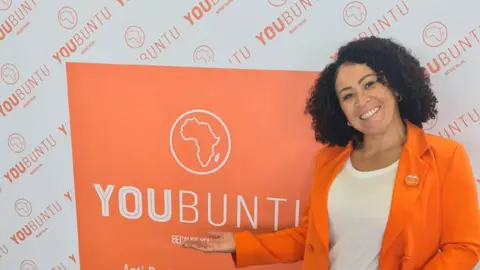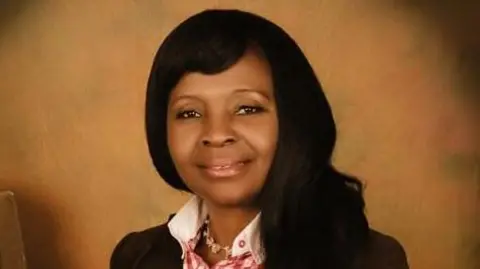'Black women deserve better' - cancer researcher
 Handout
HandoutA study from the University of Surrey has revealed what it calls "critical gaps" in breast cancer care within the black community.
The study found barriers prevent black African and Caribbean women in the UK from having screenings, which means they faced a higher risk of dying from breast cancer.
Anietie Aliu, lead author of the research, said: "Black women deserve better from the scientific and health communities."
The NHS said it had launched its first national breast screening campaign which aimed to address concerns and reach women from ethic backgrounds who were less likely to attend a screening.
 University of Surrey
University of SurreyMs Aliu said: "It is imperative that we prioritise targeted research efforts to fully understand and address the barriers these women face."
The review found that previous research often grouped black women from diverse backgrounds together, including black African and black Caribbean, masking important cultural nuances and different experiences.
The study also highlighted that the interventions designed to increase screening uptake did not target the diverse emotional and psycho-social barriers faced by Black women.
Ms Aliu said this showed the need for "more culturally sensitive research on breast cancer screening in the black communities".
Helena Boyce, a 46-year-old mother of two, was diagnosed with aggressive forms of breast cancer three times between 2014 and 2023.
She said she was not surprised by the findings of the study.
As a woman of colour, she told BBC Sounds she found herself feeling isolated during the cancer treatment due to seeing "little to no representation in leaflets, adverts [and] magazines".
"Women of colour across the country are not being given basic things like wigs that match their natural hair, prosthesis that don't match their skin tone and are dealing with the discomforts of microaggressions and stereotypes," she added.
Michelle Kane, the NHS director of screening, said: "We'd encourage everyone to attend breast screening when invited – getting your screening sorted can help provide reassurance if you are concerned, and attending could help save your life."
Follow BBC Surrey on Facebook, on X. Send your story ideas to [email protected] or WhatsApp us on 08081 002250.
